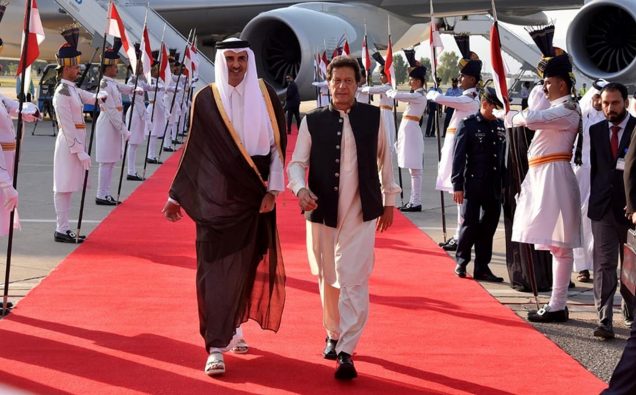
The oil-rich Gulf state of Qatar is the latest country to rescue Pakistan, announcing a $ 3 billion bailout package for the South Asian country reeling under financial crisis.
Since he came to power in July last year, Imran Khan has secured nearly $16 billion in loans and trade concessions from China, Saudi Arabia, United Arab Emirates and Qatar.
Khan, who inherited a plethora of economic troubles, has struggled to revive the economy and the IMF bailout has only seen Pakistan Rupee in free fall lately.
“I want to thank the Emir of Qatar HRH Sheikh Tamim Bin Hamad Al Thani for announcing $3 billion in deposits and direct investments for Pakistan and for Qatar’s affirmation to further develop relations between the two countries”, said Dr Abdul Hafeez Shaikh,” Dr Abdul Hafeez Sheikh, Advisor to PM Khan said on the heels of Emir HRH Sheikh Tamim bin Hamad Al Thanni’s visit to Islamabad.
So far, China has given $4.6 billion in shape of deposits and commercial loans and Saudi Arabia provided $3 billion cash deposit and $3.2 billion oil facility on deferred payments. The United Arab Emirates has provided $2 billion the cash-strapped country.
The UAE, which is at loggerheads with Qatar, withheld release of the last tranche of $1 billion after Prime Minister Imran Khan visited Qatar early this year. The terms of the Qatari financial assistance have not been released by Pakistan’s finance ministry yet.
Beijing has provided deposit of $2 billion at around 1 per cent interest rate and $2.6 billion at around 5.5 per cent interest rate. The Saudi and UAE loans have been received at over 3.2 per cent interest rates. Despite these massive inflows, the official foreign currency reserves held by State Bank of Pakistan stood at only $7.6 billion on June 14.
Additionally, the PTI government has also obtained nearly $6 billion worth of loans, from multilateral agencies, commercial banks and other bilateral sources. Successive Pakistani governments have failed to expand exports, which has increased the country’s reliance on bilateral and multilateral creditors.


















